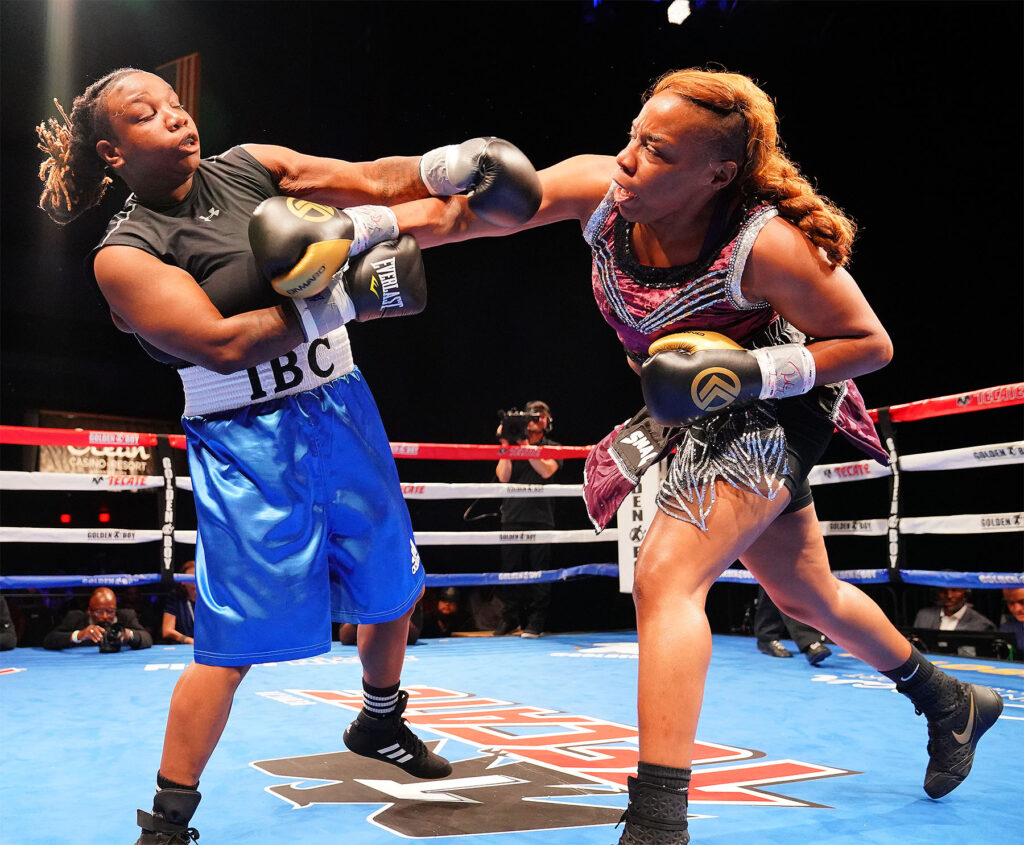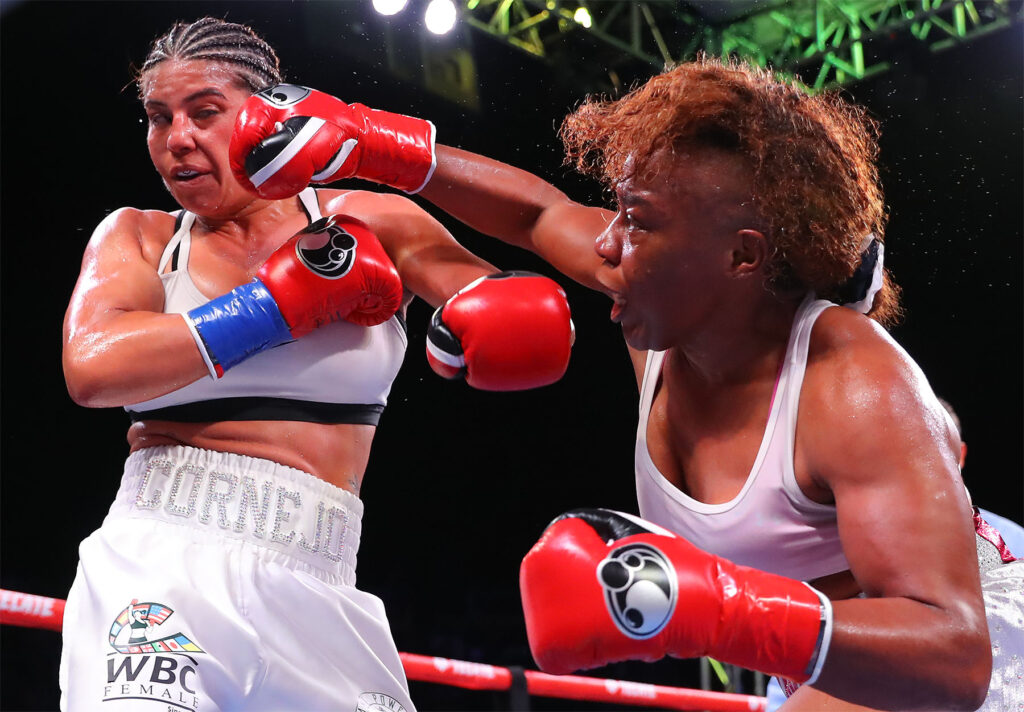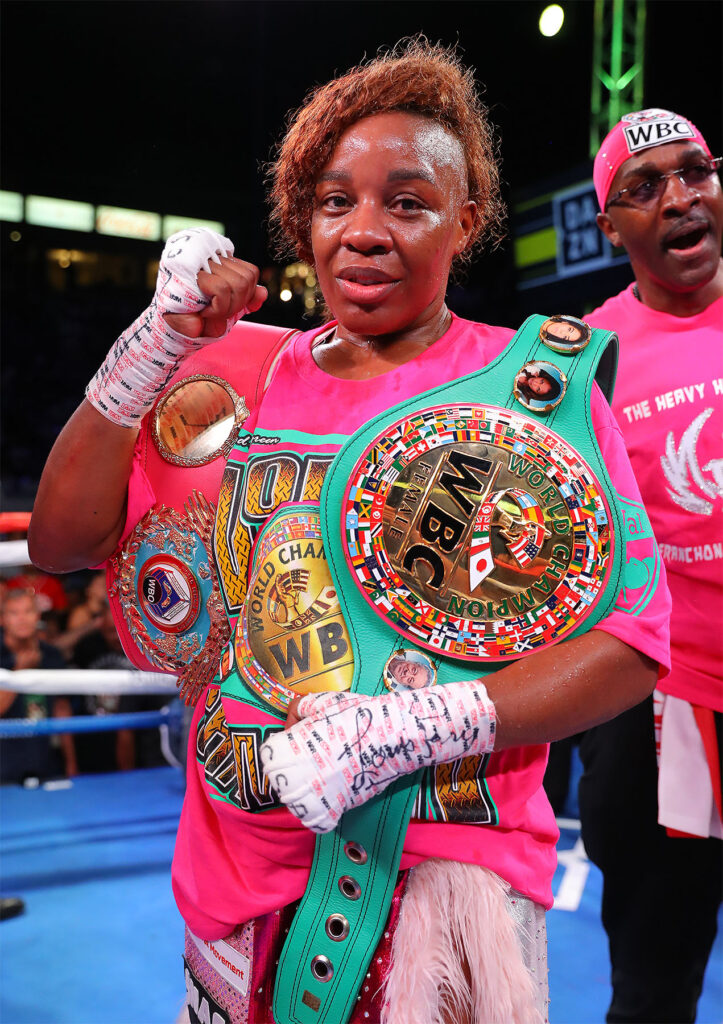“Do you want this shit? Or do you want the titles?” asked coach Barry Hunter, both panicked and passionate, frantically removing the weave from the top of Franchon Crews-Dezurn’s head as she entered the 10th and final round.
The Baltimore fighter and her head trainer were in tough – and they both knew it.
Fighting relatively unknown Mexican challenger, and significant underdog, Alejandra Jimenez – who’d previously campaigned as WBC heavyweight world champion – things had gotten uglier as the contest had developed.
Jimenez, the DAZN commentary team informed us, once weighed 308 pounds. Yet on this night, she came to the ring as a super-middleweight, vying for her American opponent’s WBC and WBO world titles. She didn’t look weight drained or tired; she didn’t appear cumbersome or slow at any point.
Punches that would have normally shaken elite women to their very core, bounced off the sharp edges of Jimenez’s chiselled jaw, or slid off the side of her head, rendered ineffective as her marauding march continued. For the champion, it felt like trying to punch her way through a steel door. That door never opened.
“We aren’t here to let her steal your future,” Hunter continued, remonstrating with his fatigued champion, embracing his penchant for colourful language at just the right time. But Crews-Dezurn (6-1, 2 KOs & 1 NC) couldn’t win on that harsh January evening. It just wasn’t fair.
It’s been almost 12 months, a global pandemic and a failed drugs test since Jimenez briefly dethroned Crews-Dezurn, but when speaking to Boxing Social ahead of her return to action against Ashleigh Curry on the January 2 Golden Boy and Matchroom Boxing USA card, the ‘Heavy Hittin’ Diva’ recalled that fight (and her last) as though it was yesterday.
“Did you watch the fight?” she asked me, ready to make a point.
“I want you to go and watch it. I’m a very expressive person. I want you to look at me in between rounds, because I knew something wasn’t right. It was all over my face. I even asked my coach, I was like, ‘Am I doing something wrong here? Because this is not normal’. I knew from before we even fought something was wrong. She’s a grown ass woman and your whole voice doesn’t change when you go through puberty. She went from sounding like Tinkerbell to Barry White.
“It was obvious, the signs, but I’m very respectful and I’m not going to ever dilute anyone’s progress. When the facts came out, I was like, ‘Oh, okay’. But you’ll never see me dash her beforehand, because you can do amazing things when you put your mind to it. But that person [Jimenez] definitely had some assistance. Even with that assistance, I still thought I won the fight.”
It becomes apparent just shortly after speaking to Franchon, that she’s one of boxing’s most interesting and fascinating characters. She switches effortlessly between inspirational improvisation and cutting dark comedy. Her story – unlike any other fighter I can recall – is a unique mixture of pain, creativity and sheer, iron will. She was born in Virginia Beach, but refers to Baltimore as “home,” and credits her late mother as her muse.
“It was just me and my mom [at the beginning]. The rest of my family was in Virginia. She just worked hard to provide for me, and to make sure I had a roof over my head, food in my stomach and clothes on my back. Everything I do is for her. She passed away in 2016, literally two weeks after I went professional. We thugged it out and… yeah, she just did her best and I’m so grateful for her.
“We lived in an attic, actually,” an emotional Crews-Dezurn explained, “It was a one-room attic of a house. When we moved to Baltimore; she got us a town house. But no matter where we stayed, it always felt like a mansion because of her love. She taught me how to make a dollar out of 15 cents and never to complain. But she also taught me the value of being compensated – whether it’s money or whether it’s prestige – for your accomplishments.
“She was a manager; she wrote manuals on how to train people. She was very good with customer service and management skills. My mom did what she had to, to make sure I had a good childhood. A lot of people talk about the struggle, but I always knew love. She just taught me to work hard for what you want.”

Photo: Hogan Photos/Golden Boy Promotions.
Now 33-years old, the fashion designer, singer-songwriter and unified world champion has set her sights on continued success, spread across all platforms. She auditioned for American Idol in front of the nation, televised for millions, and was eventually told by Simon Cowell that she, “Can’t be good at everything.”
Franchon disagrees, politely slamming the idea that it’s music or boxing, when I posed the question of which she’d prefer.
The truth is, her calibre as an amateur fighter really was stellar, and is probably overlooked as women’s boxing gathers pace amongst the casual fan. Crews-Dezurn took to the gym in an attempt to lose weight as a teen, but her love affair with the sport led to international competition and a shot at the 2016 Olympic trials when representing Kenya, with the tournament held in London.
“I’m a two-time AIBA world medallist. I was four-time Pan-Am gold medallist, one-time silver medallist. And I was a 15-time USA national champion. I grew up on the elite level. You know how some athletes have all these state and regional titles? I never had that,” she said. “Literally, in my fifth amateur fight, I won a national title and I sat on the elite level. I was actually focusing on going to the 2020 Olympic games. I was sitting on the couch [in 2016] and that’s when I got a call.”
It was the same call that had been left unanswered by 18 female fighters before her. It was a call that now, in retrospect, represents the steepest of uphill battles. But Franchon answered it. Many fighters, male or female, talk about the search for greatness, but how many really live it?
On November 19, 2016, Crews-Dezurn squared off against fellow professional debutant – and two-time Olympic gold medallist – Claressa Shields.
Shields, now dubbed the “Greatest Woman of All Time”, had toiled in the search for a respectable dance partner, but Franchon loves to dance. Despite dropping a unanimous decision to Flint, Michigan’s Shields, it was this performance that introduced her to boxing’s wider audience, and viewers were left wondering why she had agreed to tackle the best fighter of her generation.
“I felt it was my duty, because I love the sport of boxing so much. At the time, Claressa said all these women turned her down. I spoke to Claressa before the fight. We both were like, ‘We’re crazy doing this,’ but I said, ‘Look, I know if I don’t knock you out, I’m not going to win, but we have to do this for women’s boxing’. I knew that being able to showcase my ability on the same stage as Claressa Shields, such a beautiful and big stage, I knew it was a good opportunity for me as well. I did it for women’s boxing and it actually jumped started my career, too.
“I think it was good for both of us,” Crews-Dezurn continued. “I think with our pro debuts against each other, it prepared us for anything. Take me, for instance, fighting a drug cheat. If I hadn’t had a hard four rounds with her [Claressa], who knows? I know I’m skilful, I know I have ability, but the fight that I had in my pro debut was just so high impact. I felt confident that I could just do anything in the pros after that.
“It was the first time for me boxing with no head gear, other than street fighting, you know? I just bet on myself and I knew if I did my thing in the fight, win, lose or draw, I’m going to make it work. Like my mom taught me, I can make a dollar out of 15 cents. And that’s what I did.”
After asking how it felt making her professional debut at age 29, she fired back seamlessly, “I’m still 29 now!” But world titles would follow shortly after. Now promoted by Oscar De La Hoya’s Golden Boy Promotions, Franchon would grab the attention of her future employers by toppling one of their female favourites.
She climbed over former champion Maricela Cornejo to win the vacant WBC super-middleweight title (W10) and hasn’t looked back since: “I think I made a good impression on everybody because I was different. I was spunky, I could fight, and they’re like, ‘This girl is crazy – I don’t know. I don’t know about this. We like her, though’. And I would say Bernard Hopkins, he was really adamant about dealing with me.
“Golden Boy wasn’t known for a lot of female fighters [at that time]; they had just started dabbling with it. Being a minority, I have to make the company better for other minorities to have their opportunities as well, so I thought it was a good fit. I think if they could do good things with me, they’ll be able to do good things with other females and other fighters in the future.”

Photo: Hogan Photos/Golden Boy Promotions.
So far, so good, for both the fighter and her promoter. And, as final preparations are underway and her team enter fight week, Baltimore’s only female world champion was flowing freely in conversation. She was discussing her fantastic chat with Gareth A. Davies for his intriguing article about race and lack of ethnic identity; then she’d bounced on, speaking about her relationship with her husband, Glenn, also a fighter and pillar of support.
Franchon has so many layers, and so much to say. It’s almost a shame it’s taken this long for boxing to shine its light and find her centre stage. But she knew her time would come.
The hyperactive schoolgirl throwing her energy at multiple, creative outlets had found success at the highest level in boxing. She described herself as “a phoenix,” and explained her own struggles through the pandemic and the police brutality that swept America during the height of the summer’s BLM movement. But she is still standing, because “what doesn’t kill you makes you stronger”.
I wondered, given everything she’s been through, and considering the plates she continues spinning on her damaged, unwrapped hands, what is Franchon Crews-Dezurn’s biggest struggle?
“That I was born a female. That’s it: I was born a female, and I’m a brown woman, too. I have two strikes against me, but those are actually my strengths, because if I’m still able to flourish with two strikes people that would expect you to fail with, then that inspires other people like me. It just shows that if you bet on yourself you can still win,” she said.
“I am the writer of my own story and I am the author of my destiny. And no, you can’t marginalise me. I’ll do it. I’ll sing before I fight. I’ve done it before; I can do it again. I’ve sang the national anthem and then boxed. Because I am multifaceted, not just a singer, I’m a songwriter. I don’t have to be in front of the camera. I can write songs and have other people sing my music and still have a boxing career. I would never limit myself. If I have a problem, I will keep trying to figure it out. And that’s what I’ve been doing my entire career – my entire life.”

Photo: Hogan Photos/Golden Boy Promotions.
Main image and all photos: Golden Boy Promotions/Hogan Photos.